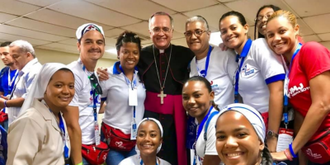Nicaragua: Interview with Bishop Silvio Baez

Bishop Silvio with the Sisters in Mallorca
Bishop Silvio José Báez, OCD, the Auxiliary Bishop of Managua, Nicaragua, has made himself one of the voices who have been most critical of President Daniel Ortega's Sandinista regime. During a recent stay in Mallorca, he issued a call to build a Church "at the service of human fulfillment", a Church that is more "prophetic and less diplomatic". We present a translation of his interview with Mater Purissima review, a publication of the Pureza de María Sisters.
MP: What should distinguish a Christian today? Going to Mass? Their social or political commitment? Evangelizing in social media?
+SJB: In the first place, a Christian must distinguish himself by a very clear stance in favour of human dignity. Let's not forget: God became man and died to save us. That's why for Christians this commitment in favour of humanity is decisive, their ability to create relationships based on a sense of community, working to build more peaceful societies, more just, more human… taking care of the planet, because the faith has an ecological dimension. In a nutshell: the Christian fights so that human beings may live with greater dignity, and it is in this relationship with others that we express our faith in a concrete way. We also must work in social media so that this option for the human being may be rediscovered, which is summarized in this simple message of Jesus: "Whatever you did for one of the least of these brothers and sisters of mine, you did for me" (Matt. 25:40).
MP: There are those who criticize the Pope and think he's a Communist, considering the social dimension of the messages that he issues.
+SJB: They're unfounded criticisms, too ideological. Humanity has been God's path. The human being isn't at God's level, but rather is the way to reach Him. What then does faith bring us? Is it another form of philanthropy? No, it's more than that: it's the light that helps you discover God's image in others. With this bond of union, faith gives you great inner strength and unwavering hope. It also provides comfort when we face failure, weariness, or lack of gratitude. Without faith, this commitment to others is either diminished or ideologized. The faith in a God who loves humanity is celebrated in the Eucharist and nourished in prayer. In this profound experience of God's love, in this encounter, faith opens up your ideological narrowness.
MP: Then does religion have to focus on the person and stay in the private sphere?
+SJB: A faith that makes no incision into the social and political spheres is incomplete. Believers must always question themselves, from their faith in Jesus Christ, what's their perception of reality? What they can contribute to improving it is not a matter of politicizing the faith, nor of making it an ideology. Sometimes faith has been reduced to extremely individualistic religious experiences, centered only around parish and family life, which indeed fosters encounters among others, however, they are restricted to small groups. Those encounters also must be built further, because that's not all there is. Faith also is manifested in the struggle for a better world, in building relationships that are more just, that's why there's also a social, political, and ecological dimension. The risk in taking this step is to make such a departure that ends up emptying the faith, that is why it is so important to continuously feed the inner experience of a personal encounter with Jesus Christ, as well as life in the community of believers. Therefore, an education in the faith is also necessary, which takes into account all these dimensions. When I was speaking to the priests in Nicaragua, I told them that either they would be mystical prophets, or they would be nothing. A life of faith that becomes prophetic has a share of consolation and another of denunciation. A faith that is reason alone is cold: you have to integrate feelings, which also include negative or frustrating experiences.
MP: Does that mean that we have to form Catholic parties?
+SJB: It's not about forming confessional groups. We already have overcome this phase. It's about living within a society what faith inspires within me, in communion with others: with other Christians, yes, but also with people who are non-believers, in search of common objectives. We all can share a desire for a more just and peaceful society, a better society. Therefore, I dream of a Church that is not the sole proprietor, but the servant of the truth, of a truth that we seek in all areas of life:
a Church much more prophetic than diplomatic, one that doesn't make peoples' lives more difficult, but seeks to heal their lives, down to the root of their problems;
a Church conscious of being at the service of something much greater than she, at the service of the Kingdom of God; and,
a Church that doesn't exist just to satisfy the people's religious sentiment, but rather a Church at the service of a meaningful, fulfilling human life, with just and peaceful relationships, a Church that cares for nature.
To read on see: https://carmelitequotes.blog/2019/06/23/faith-that-cuts-deep-an-interview-with-bishop-silvio-baez/


















